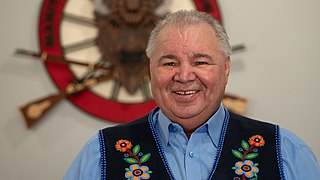Related Research Articles
First Nations is a term used to identify those Indigenous Canadian peoples who are neither Inuit or Métis. Traditionally, First Nations in Canada were peoples who lived south of the tree line, and mainly south of the Arctic Circle. There are 634 recognized First Nations governments or bands across Canada. Roughly half are located in the provinces of Ontario and British Columbia.

The Indian Act is a Canadian act of Parliament that concerns registered Indians, their bands, and the system of Indian reserves. First passed in 1876 and still in force with amendments, it is the primary document that defines how the Government of Canada interacts with the 614 First Nation bands in Canada and their members. Throughout its long history, the act has been a subject of controversy and has been interpreted in different ways by both Indigenous Canadians and non-Indigenous Canadians. The legislation has been amended many times, including "over five major changes" made in 2002.

The Manitoba Act, 1870 is an act of the Parliament of Canada, and part of the Constitution of Canada, that provided for the admission of Manitoba as the fifth province of Canada.

Alexander Morris was a Canadian politician. He served in the cabinet of Prime Minister John A. Macdonald (1869–1872), and was the second Lieutenant Governor of Manitoba (1872–1877). He also served as the founder and first Lieutenant Governor of the District of Keewatin.

Rod E. Bruinooge is a Canadian politician, businessman, and filmmaker. He was elected as the Member of Parliament (MP) for Winnipeg South in the 2006 federal election, and was the Parliamentary Secretary to the Minister of Indian Affairs and Northern Development and the Federal Interlocutor for Métis and Non-Status Indians from 2006 until the fall of 2008.

The Métis are Indigenous peoples in the three Prairie Provinces, as well as parts of Ontario, British Columbia, the Northwest Territories, and the Northern United States. They have a shared history and culture and are of mixed Indigenous and European ancestry which became a distinct group through ethnogenesis by the mid-18th century, during the fur trade era.

Thomas Eugene Flanagan is an American-born Canadian author, conservative political activist, and former political science professor at the University of Calgary. Flanagan has been on "research and scholarship leave" from the University of Calgary since January 2013. He also served as an advisor to Canadian prime minister Stephen Harper until 2004.
The Aboriginal Justice Inquiry (AJI), officially the Public Inquiry into the Administration of Justice and Aboriginal People, was a public inquiry commissioned by the Manitoba government into the administration of justice regarding the 1971 murder of Helen Betty Osborne and 1988 death of J.J. Harper. Commissioned in 1988, with its final report presented in 1991, its stated purpose was "to examine the relationship between the Aboriginal peoples of Manitoba and the justice system."

David N. Chartrand, is a Métis politician and activist who has served as the democratically elected President of the Manitoba Métis Federation since 1997. He is the longest-serving President of the Manitoba Métis Federation's history, currently serving a seventh term. He served as a member of the Board of Governors of the Métis National Council from 1997 to 2021 and held most portfolios throughout his tenure.

Calvin Murray Sinclair, is a former member of the Canadian Senate and First Nations lawyer who served as chairman of the Indian Residential Schools Truth and Reconciliation Commission from 2009 to 2015. He previously served as a judge in Manitoba from 1988 to 2009, being the first Indigenous judge appointed in the province. Sinclair was appointed to the Senate of Canada on April 2, 2016. In November 2020, he announced his retirement from the Senate effective January 31, 2021.
Robin A. Finlayson was appointed to the Provincial Court of Manitoba on February 1, 2006.

The Truth and Reconciliation Commission of Canada was a truth and reconciliation commission active in Canada from 2008 to 2015, organized by the parties of the Indian Residential Schools Settlement Agreement.
Aboriginal child protection describes services designed specifically for protection of the children of "aboriginal" or indigenous peoples, particularly where these peoples are a minority within a country. They may differ at international, national, legal, cultural, social, professional and program levels from general or mainstream child protection services. Fundamental human rights are a source of many of the differences. Aboriginal child protection may be an integral or a distinct aspect of mainstream services or it may be exercised formally or informally by an aboriginal people itself. There has been controversy about systemic genocide in child protection systems enforced with aboriginal children in post-colonial societies.
The Kimelman Report had a substantial and lasting impact on aboriginal child protection in Canada that was part of a fundamental shift in international child protection paradigms for aboriginal peoples.
Edward N. "Ted" Hughes was a Canadian retired judge. He was best known for overseeing prominent investigations in Manitoba, Saskatchewan and British Columbia, one of which led to the resignation of Premier Bill Vander Zalm.
The Sixties Scoop was a period in which a series of policies were enacted in Canada that enabled child welfare authorities to take, or "scoop up," Indigenous children from their families and communities for placement in foster homes, from which they would be adopted by white families. Despite its name referencing the 1960s, the Sixties Scoop began in the mid-to-late 1950s and persisted into the 1980s.
Richard Cardinal: Cry from a Diary of a Métis Child is a 1986 National Film Board of Canada documentary film by Alanis Obomsawin, about the suicide of Métis youth Richard Stanley Cardinal, who killed himself in 1984 at the age of 17. Cardinal, who had been placed in 28 different homes during his 14 years in Alberta's child welfare system, hanged himself from a cross bar he had nailed between two trees near his last foster home, northwest of Edmonton.
Gerald Morin is a Métis politician who served as president of the Métis National Council and the Métis Nation—Saskatchewan, also serving as vice president for the latter.
Robert-Falcon Ouellette is a Canadian politician, who also goes by the initials of RFO or simply called The Falcon, who represented the riding of Winnipeg Centre in the House of Commons of Canada for one term. He was previously a candidate for Mayor of Winnipeg in the 2014 municipal election, finishing third.

John Morrisseau is a Métis politician and former leader of the Manitoba Métis Federation (MMF) in Manitoba, Canada, from 1976-1981. He also served in the Manitoba provincial government as Assistant Deputy Minister and Deputy Minister of Northern Affairs from 1982-1987. John received the Order of Canada in 2021 for his work as a Metis historian and political activist.
References
- ↑ Lawrence J. Barkwell, Lyle N. Longclaws and David N. Chartrand, "Status of Métis Children Within the Child Welfare System" ] (1989) 9 Cdn. J. Native Studies 33; https://www.brandonu.ca/Library/CJNS/9.1/metis.pdf Archived 2013-02-16 at the Wayback Machine , accessed 17 October 2008.
- ↑ Pauline Comeau & Aldo Santin, The First Canadians, James Lorimer & Company, Toronto (1995), p. 145.
- ↑ The Law Society of Manitoba Communiqué (January 2008, p. 10).